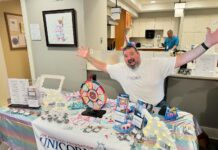
PROVIDENCE – When five University of Rhode Island nursing students travel to Liberia this spring to help treat patients at a Partners in Health clinic, they’ll be carrying some words of advice on the endeavor from Dr. Paul Farmer, co-founder of the global health initiative, who visited the Rhode Island Nursing Education Center in Providence on Dec. 12.
During Farmer’s talk, “The Caregiver’s Disease: Ebola and the Challenge to Nursing in West Africa,” sponsored by the URI College of Nursing, he offered instruction to juniors, seniors and graduate students at the center, part of the new South Street Landing development.
“These places are clinical deserts compared to Haiti,” said Farmer, the renowned physician and medical anthropologist credited with revolutionizing health care in the Caribbean nation. “During the Ebola crisis, 99 percent of the deaths were in three countries [Liberia, Sierra Leone and Guinea]. Why? Well, they just didn’t have health systems. I can’t imagine any work that is more satisfying than going to a place and giving medical services to those who don’t have them.”
Farmer told the audience about a young girl in West Africa in 2014, during the height of the Ebola crisis, he had seen at an Ebola treatment unit in Liberia organized by Partners in Health. The child’s whole family had succumbed to the disease, leaving her frightened, alone and facing an uncertain future with no one to care for her.
“A clinician – probably a nurse – removed her [the girl’s] earrings and had the awareness to put them in Clorox rather than just throw them away,” Farmer said. “Those earrings were the only thing the baby had to remind her she even had parents.”
The story, Farmer said, is a reminder that health workers should provide care as well as treatment.
Elaine Parker-Williams, a doctoral student in nursing at URI who is from Liberia, will lead the URI nurse practitioner students who will work with patients at J.J. Dossen Memorial Hospital in Maryland County, Liberia, focusing on those suffering from diabetes and hypertension, some of the leading causes of death in West Africa.
“The students will be able to assess patients, diagnose and recommend treatment,” Parker-Williams said. “This is a global initiative for the university, so we can see what is happening in health care in developing nations. We’re exposing the students to these areas of need, which will hopefully gear them toward careers in global health.”
The URI students – Bethany MacLeod, Kristen Remeika, Caryn Amedee, Phoebe Hall and Christina Lewis – got some advice from Farmer while meeting privately with him and URI faculty and administrators for more than an hour before his presentation. Farmer described what is needed from health care workers overseas.
“You’re not going to become culturally competent. I’m not culturally competent in Haiti and I’ve been going there for 35 years,” Farmer told the students. “What you really need to know is how to nurse. We need nurses who can nurse and doctors who can doctor. That’s what we didn’t have during the Ebola crisis.”
Farmer said some locals attributed the cause of the disease to spiritual origins, and many assumed the victims’ own actions or eating habits worsened the outbreak.
“The drive toward exoticism is a big problem with infectious disease,” Farmer said. “These people didn’t die from eating bush meat or from anything they did, but because of a lack of medical care. The first thing we do in one of these outbreaks is stop caring for the sick (instead, simply isolating them in an attempt to slow the spread). That is particularly painful for clinicians, especially nurses.”
Those health care workers continue their mission despite the extreme dangers they face, especially in poor regions lacking proper sanitation and protections for those working with patients.
“Caregivers were the most at risk,” Farmer said, noting hundreds of nurses and doctors contracted the disease while treating patients. “It’s especially tragic for health care workers who knew what they were getting into and still tried to help save families.”
Rob Borkowski is a PBN staff writer. Email him at Borkowski@PBN.com.












